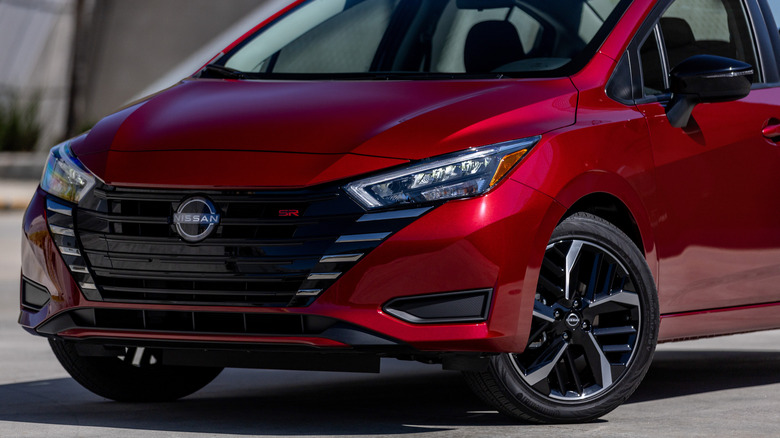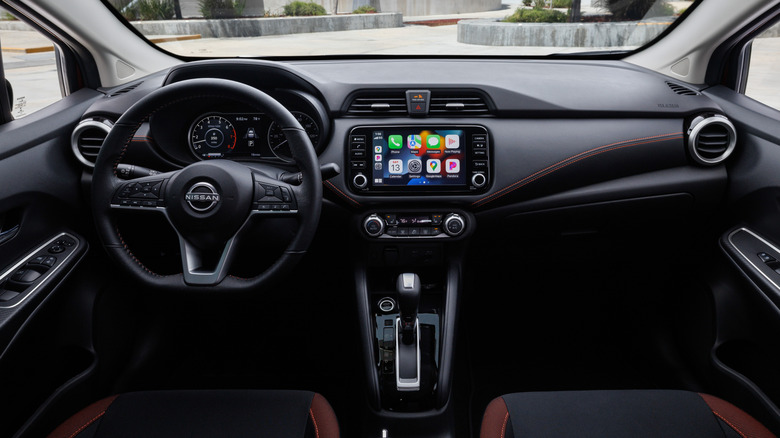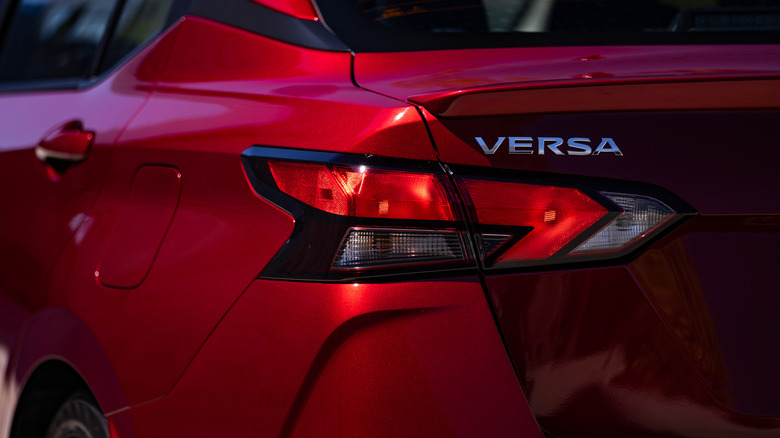Is The Cheapest New Car You Can Buy In America Worth It?
Let's get the obvious out of the way: In 2025, the cheapest new car in the U.S. is the Nissan Versa. With a base price of $18,330 (including a $1,140 destination charge), it undercuts the most affordable offerings from Hyundai and Kia by a couple of grand. Once a rival to the now-discontinued Mitsubishi Mirage subcompact, the Versa now owns the bargain-car title. But does buying the cheapest new car make sense? In many ways, yes—so long as buyers know what they're getting and giving up. If you'd asked me this earlier in the decade, I'd have said "no" without hesitation. But the third-gen Versa, launched for 2020, changed my mind with its modern styling and decent features.
My first time behind the wheel was in a 2019 rental. Fifteen minutes in, I was back at the counter paying for an upgrade. The thought of crawling along a Nevada highway in that thing was too much. The 2023 refresh caught my eye, but I didn't revisit it until helping someone shop for a cheap new car last year. The leap between the second and third generation was striking. It still doesn't drive like a Mazda3 or Civic, but I wouldn't think twice about renting one—or recommending it to a budget-conscious buyer.
I'm not alone in these thoughts. Consumer ratings on Edmunds average a respectable 4.0 out of 5.0 for the current-generation Versa. One owner commented, "This car is the best deal out there." Another said, "It's really, really good. Amazing for the price." A 61 out of 100 rating from Consumer Reports isn't exactly glowing for the 2025 model year, but that's enough for a "CR Recommended" badge. Here's what buyers need to know.
Nissan Versa delivers bang for the buck
The Versa occupies the spot as the only new car in the U.S. under $20,000 for the 2025 model year. That's a significant benchmark when the average used vehicle sells for more than $25,000. The new car warranty is the real appeal here. Moreover, buyers who want to row their own gears will appreciate that the cheapest Versa comes with a five-speed manual transmission. Adding a continuously variable transmission (CVT) costs an additional $1,800, bringing the window sticker price, including transportation fees, to $20,130. One Redditor remarked, "Still amazed I was able to buy a brand new car for 17k... This will likely be the last new car with a manual I can buy."
The base trim S trim also comes with many advanced driver aids, including automatic emergency braking, pedestrian detection, lane departure warning, rear automatic braking, and automatic high beams. Standard tech features, such as a 7-inch infotainment touchscreen and multiple USB ports, show that Nissan didn't leave the Versa in the 20th century. The sweet spot lies with the mid-tier SV edition, which costs $21,630 (including destination charges). The SV trim adds the CVT and tech like Apple CarPlay, blind-spot monitoring, and a wireless charger for just $1,500 more.
The price jump to the top-of-the-range SR trim isn't outrageous either, with a freight-included price of $22,330. That $700 more than the SV trim nets buyers heated front seats, automatic climate control, an 8-inch touchscreen, satellite radio, Nissan Connected Services, proximity keyless entry, remote start, a leather-wrapped steering wheel, access to a Wi-Fi hotspot, heated side mirrors with LED turn signal indicators, and 17-inch alloys. The Versa SR is still cheaper than a base Toyota Corolla, Honda Civic, Mazda Mazda3, Hyundai Elantra, or Kia K4 (when including destination charges).
Understanding the Nissan Versa's shortcomings
Appreciating the Versa's value doesn't come without acknowledging its faults. At the top of the list is Nissan's reputation for troublesome CVTs. An early 2025 SlashGear article about cars with notoriously bad transmissions identified the Nissan Altima and Rogue as among these offenders. The Versa wasn't included, but its similar CVT may still worry buyers. Another Redditor commented, "The CVT issue is seriously overblown... replace the CVT fluid every 30K miles and you'll be fine." During my time driving the latest Versa, I found the CVT to be a significant improvement over the previous generation. However, it's still a CVT programmed for fuel economy over performance.
There's also no escaping that the third-generation Versa has a small cabin. I had no problem in the first row (I'm 6 feet 2 inches), but the back seat is another story. The 31 inches of second-row legroom is best suited for younger or less-tall passengers. A Redditor chimed in with, "The seats tend to be less comfortable than a larger car." In addition, if leather upholstery, a sunroof, or ventilated front seats are must-haves, then you'll need to keep shopping; the Versa doesn't offer these as factory options.
These shortcomings bring up the obvious question: Is it better to buy a new Nissan Versa or a used Toyota or Honda? The answer lies with each shopper, but here's what you can expect to buy for approximately $20,000 when purchasing a used Corolla or Civic. Kelley Blue Book (KBB) reports that the average national fair price for a 2021 Toyota Corolla XSE sedan (a higher trim) runs about $20,300 and $20,500 for a Honda Civic EX-L sedan (also a premium edition). Alas, the decision may be simplified as rumors abound about Nissan discontinuing America's cheapest new car after 2025.


